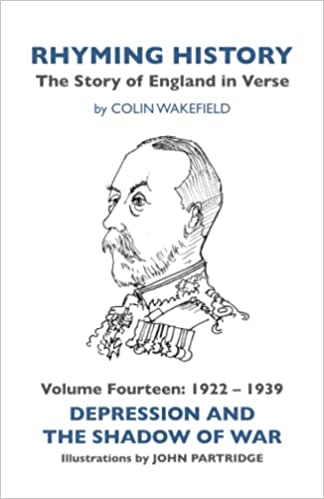Volume Fifteen – 1939 – 1945
The Second World War
THE BBC
RAMSAY MACDONALD’S GOVERNMENT
THE MINERS
NOËL COWARD
HITLER AND GERMAN REARMAMENT
EDWARD THE EIGHTH
THE PRIME MINISTER VISITS HITLER
RADAR
WAR WITH GERMANY
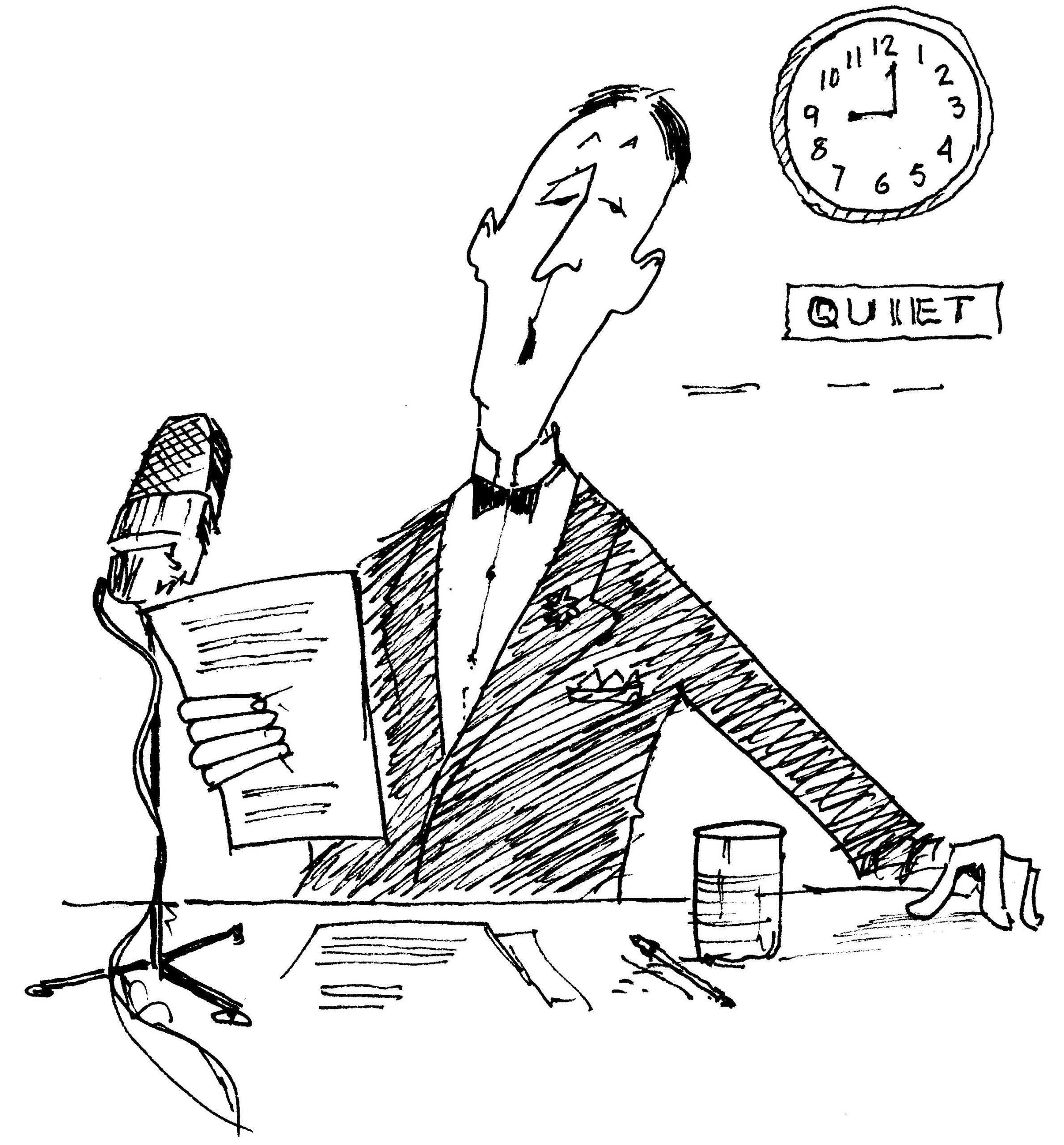
THE BBC
An institution revered today
Is the BBC: a radio play,
News and comment, music, a whole array
Of quiz programmes, light entertainment shows,
Science and the arts, and Lord alone knows
What else… It all began in ’22,
When Britain experienced something new:
A national broadcasting service.
The government was thought to prefer this
To the hitherto unregulated
System of ‘free’ broadcasts. These they hated.
For competing radio frequencies
Were causing considerable unease
In military circles – civil, too.
Interference (this the GPO view)
Put the country’s security at risk.
The government’s response was bold and brisk.
So was born, out of sheer necessity,
That distinguished body, the BBC.
A business outfit, initially,
Viz. the British Broadcasting Company,
It enjoyed a sort of monopoly.
Earlier broadcasts, in 1920,
By the Wireless Telegraph Company
(Live programmes from Marconi’s factory,
In Chelmsford), had proved a splendid success.
The voice of Dame Nellie Melba, no less,
Had moved listeners to tears. The craze
For radio, in those inventive days,
Ran deep and was clearly far from a phase.
The GPO were deluged with requests,
By ’22, from vested interests,
For licences – just shy of a hundred.
Hence the decision to form, instead,
One single company (the BBC),
Controlled by one consortium, jointly,
Of leading radio manufacturers.
This new body, as its title infers,
Remained a commercial enterprise.
Effectively a government franchise,
It was financed by a fixed royalty
On all sales (approved by the BBC)
Of wireless receivers. As you can see,
The company enjoyed a monopoly,
But income was driven commercially.
In 1926 a new licence fee
Replaced the idea of a royalty.
The BBC’s broadcasting monopoly
Was made more explicit, as the ‘Company’
Was transformed into the ‘Corporation’.
This radical reorganisation
Was to guarantee the reputation
Of the BBC, across the nation,
For public service. I can tell you for free
That the newly constituted BBC,
Created by Royal Charter, owed its success
To its spirit of independence. I digress…
John Reith (thirty-three) was pleasantly surprised
To see, in the press, a new post advertised:
General Manager of the BBC.
He got the job, and the rest is history.
Reith, it seems, had little or no idea
What broadcasting involved. But they said, “Sign here”,
So he did. It was the perfect appointment.
Reith was a dynamo. Wherever he went,
He commanded trust, respect and loyalty.
His simple mission for the BBC
Was to “inform, educate and entertain”,
A policy he stressed again and again.
Reith’s influence from the outset was stunning.
He rolled up his sleeves and hit the ground running.
Within days, we are told, of his arrival,
Excerpts from The Magic Flute (a revival)
Were aired from Covent Garden. Programmes for schools
Followed in weeks. Never one to suffer fools,
Sir John (as he became) ruled the BBC
With a rod of iron. His drive, energy
And all-embracing code of morality
Were the standard. His announcers set the tone,
Made to wear, as they addressed the microphone,
Dinner jackets! And this was radio, yes!
Rather over the top, I have to confess.
The news headlines, broadcast live from ‘2LO’,
The name of the Marconi House Studio,
Were the first words ever to be heard on air
From the BBC. Listen! You’ll feel you’re there!
“Marconi House calling!” read Arthur Burrows,
With his ‘Oxford’ accent. Everyone knows
That this was the only acceptable voice.
Put a plum in your mouth. You had little choice.
The fact that John Reith himself was a Scot
Appeared, in truth, not to matter a lot.
Following the grant, in 1926,
Of the Charter, other programmes joined the mix:
Twickenham (international rugby);
The famous Grand National (from Aintree);
The Boat Race… All now on the BBC.
Trooping the Colour; tennis from Wimbledon;
The first Promenade Concerts… The list goes on.
Even an Orchestra, in 1930,
Joined the payroll: the ‘BBC Symphony’.
RAMSAY MACDONALD’S GOVERNMENT
Labour was in office by permission
Of the people, and MacDonald’s mission
Was to prove himself worthy. Stability,
Confidence, fiscal responsibility
And competence would earn the nation’s trust.
A strong, realistic programme was a must.
He failed, though he scored some successes – just.
His Chancellor, Snowden, balanced the books,
Proving that Labour, far from being crooks,
Could manage the budget responsibly.
MacDonald’s Health Minister, John Wheatley,
Confounded Labour’s critics completely
With his hugely popular Housing Act.
Homes for rent (an unpalatable fact)
Were scarce and in high demand. Wheatley increased
The subsidy (on new rental builds, at least)
To councils. His was a long-term strategy,
A fifteen-year plan. The building industry,
The government and local authorities
Worked together, with the help of subsidies,
To build over half a million houses.
The kind of bitterness that this arouses,
And envy, is of interest. John Wheatley,
A figure of outstanding ability,
Along with his ‘Clydeside credibility’
As a highly regarded Glasgow MP,
May have fuelled a rare sense of jealousy
In MacDonald. For there was no place for him
In Mac’s second government. Signally dim.
There was progress in education too.
Concrete achievements were relatively few,
Owing to the brief life of the government.
But Labour’s policies were a testament
To its high ideals and thirst for reform.
Strict economies for schools had been the norm
Under the Tories and the Coalition.
Happily, Labour reversed the position.
C. P. Trevelyan, at Education,
Showed skill in his dogged determination
To raise standards in schools across the nation.
He reviewed many of the economies
Imposed by the mean, penny-pinching Tories.
Local education authorities
Were afforded greater independent scope,
And Trevelyan even proposed (some hope!)
Raising the school leaving age to fifteen.
The Second World War was to intervene
Before this could be achieved. Nevertheless,
Trevelyan, in his short time in harness,
Displayed a far-sightedness and a goodwill
That should serve as an example to us still.
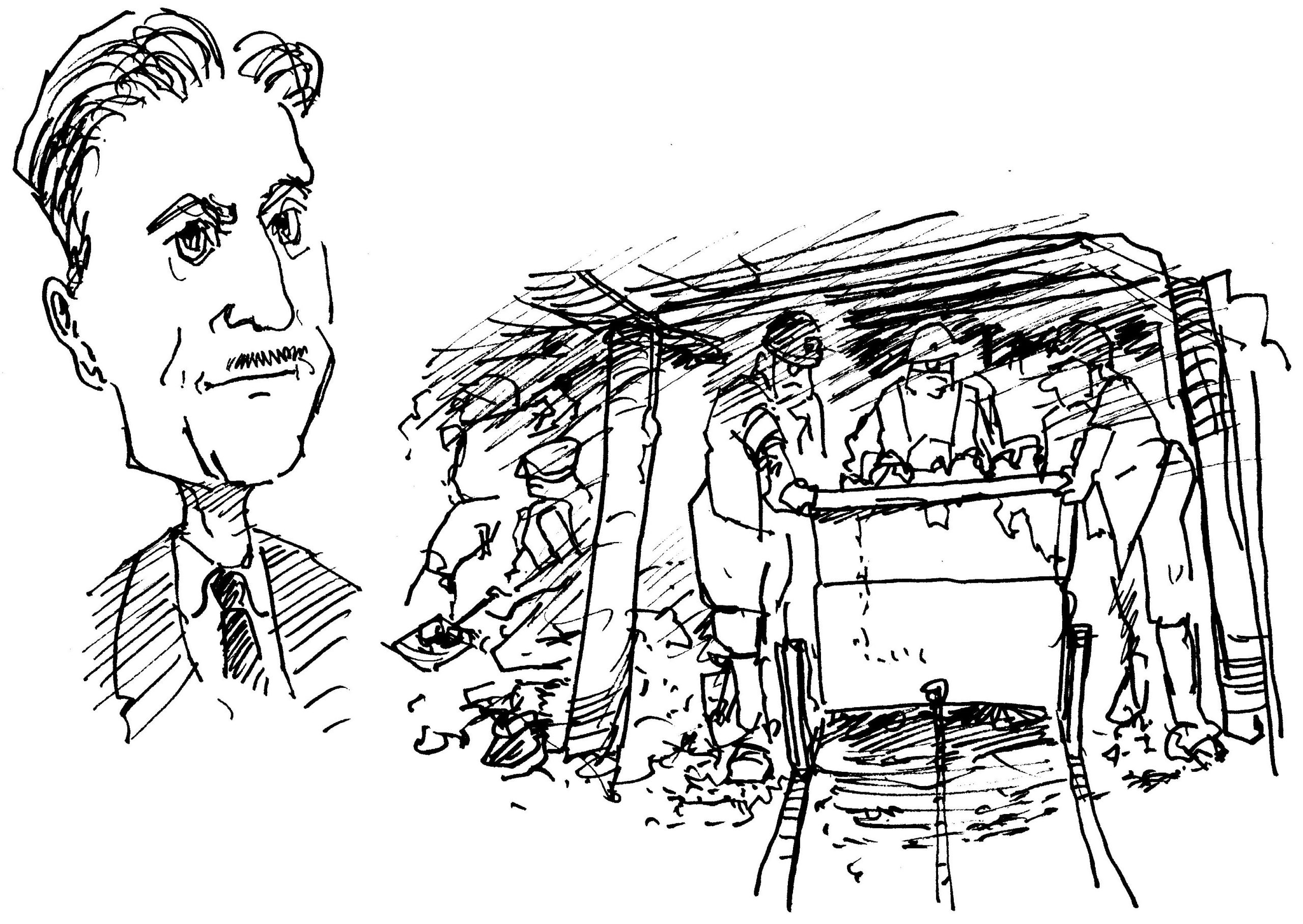
THE MINERS
Discontent in the mining industry
Had reached a new high. The obduracy,
Of the owners, had alienated
The mineworkers. The pits were outdated,
And dangerous. Modernisation
They scorned, to the intense frustration
Of both the Miners’ Federation
And the government. Nationalisation,
A dirty word, had been kicked into touch.
Neither party felt inclined (well, not much)
To engage in talks. Coalfields in the Ruhr,
Back in production since ’24,
Had knocked the bottom out of British coal.
The German industry was on a roll.
Mines were running at a loss. What to do?
To tell the honest truth, nobody knew.
Putting the pits into profit again
Would involve the miners taking the strain,
So argued the owners. That kind of pain,
Countered the workers, was not on the cards.
They sent the employers their best regards,
But their message was plain. To take a cut
In wages? Sorry, mate: anything but.
The owners insisted on longer hours
And lower earnings. Nobody had powers,
Least of all the government, to enforce
An agreement. The TUC (what sauce,
Huffed the owners) sought to negotiate –
But no, the miners were left to their fate.
Their slogan, “Not a penny off the pay”
Touched a nerve – “Not a minute on the day”.
The owners dug in. German mining boomed,
On the Ruhr, while here a miners’ strike loomed.
The transport workers and the railwaymen
Backed the mineworkers. It was only then
That the government took proper notice.
The TUC (Baldwin took note of this)
Gave orders for a total embargo
On the movement of coal, a severe blow
To hopes of a constructive settlement.
This, of course, they would only implement
In the event of a strike. In his heart,
Baldwin believed (an unpromising start)
That a wage cut was inevitable.
But extra hours? That seemed terrible.
Deadlock. The owners threatened a lockout.
A general strike, no shadow of doubt,
Was now in prospect. With hours to go –
A mere twenty-six, if you want to know –
Baldwin stepped in. He’d said that he wouldn’t.
But sit on his hands? He simply couldn’t.
His answer was a fudge, it seems to me:
The payment to the mining industry
Of a large sum of government money,
In the form of a ‘bridging’ subsidy,
To buy time for a public inquiry
To report on the subject of mining.
Every cloud has a silver lining…
Well, not this one. The Samuel Report
Died the death. A solution was sought,
But none was found. The Report was a farce,
All three hundred pages of it. ‘Long grass’
And ‘kicked into’ are words that spring to mind –
Or am I being unduly unkind?
Writing a decade later, George Orwell
Had a deplorable story to tell
Of a miner’s life: the conditions
Down the pit; the worn-out traditions
Of employment; the dire rates of pay;
The agony suffered, day after day,
Shift upon shift, to provide us with coal.
A simple observer was Orwell’s role.
Read The Road to Wigan Pier, I urge you.
His report, every single word true,
Of the working life of a miner… Well,
It was his “own mental picture of hell”.
The heat, the noise, confusion, foul air,
The confined space… But it was getting there,
To the coal face, that took him by surprise.
How, of course, could it have been otherwise,
As Orwell later came to realise?
A miner might have to travel three miles
From pit head to coal face. But what still riles
Is that the journey, cramped and bent double,
Was not part of his shift. For his trouble,
The miner’s seven-hour day began –
Or eight, according to the owners’ plan –
Only when he started work. A stranger,
Like Orwell, was alert to the danger
Of pit explosions and accidents.
The miners themselves (this has to make sense)
Appeared to become accustomed to it –
The risk, I mean. Disasters, down the pit,
Were commonplace. A sober estimate
Put the chance of escaping injury,
Over forty years in the industry,
At seven to one against. Hold your breath:
The risk, for miners, of escaping death
Was twenty to one. And a miner’s pay,
In the thirties? The going rate, per day
(Or per shift), might total, on average,
Nine shillings. Now that’s quite a decent wage,
Believe it or not, if he worked all year.
But the summer season brought little cheer.
Demand would slacken, with workers laid off.
The weekly wage was a spit and a cough
(Compared to winter) in warmer weather.
Taking all circumstances together,
The gross earnings in 1934,
For a miner, kept the wolf from the door,
But only barely. Deduct insurance,
And the hire (this beyond endurance)
Of his Davy lamp from the company,
The Benevolent Fund, Union Fee –
All the miner’s responsibility –
And his pitiful lot is plain to see.
I have written enough. I can’t compete
With George Orwell. His picture is complete.
Do read the book, The Road to Wigan Pier.
I can’t do proper justice to it here.
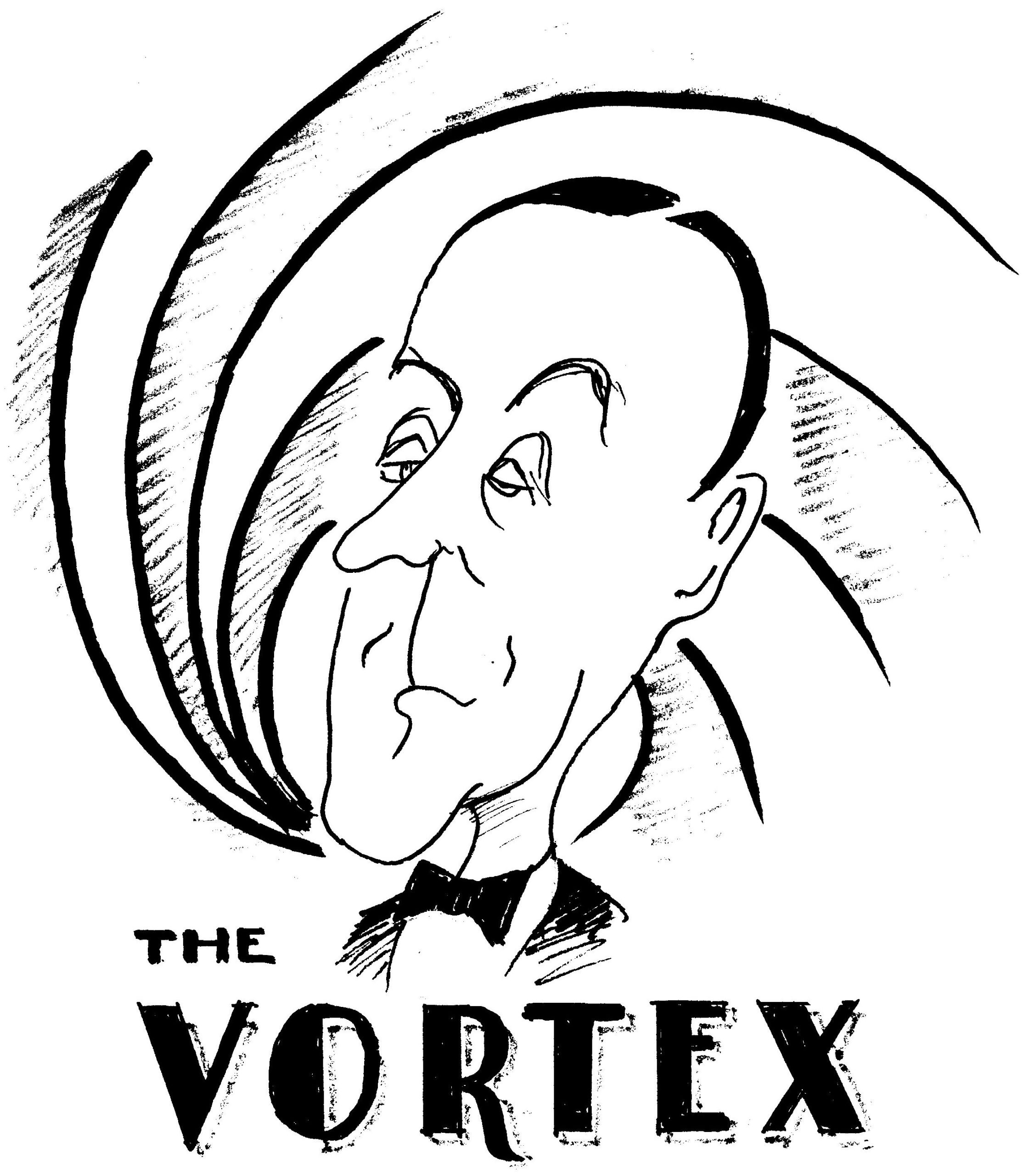
NOËL COWARD
The twenties were the defining decade
For Noël Coward. The old guard were dismayed
(Or purported to be) by his louche style,
His clipped vowels and his enigmatic smile,
But he won the race, by a country mile,
To become the new talent: dramatist,
Producer, composer and lyricist,
Actor and director – that’s quite a list.
He made his stage début in The Great Name,
Playing a pageboy. Noël’s road to fame
Began early (he was twelve at the time).
Stage-struck after seeing a pantomime,
Aladdin, in Kingston (1903),
The boy was set, you can take it from me,
On a stage career. It simply made sense.
No figure had a greater influence,
In theatre, between the wars, than he.
His first sure-fire success was, strangely,
A serious piece, his play The Vortex.
It dealt with drug abuse (a code for sex?),
The first drama in England so to do.
Coward was challenging; Coward was new.
The Vortex (Noël himself in the lead)
Opened in triumph and, set to succeed,
Transferred from Hampstead to London’s West End,
Where the young playwright’s ‘talent to offend’
Drew in the crowds. The play was a huge hit.
Noël Coward had arrived, and that was it!
The Vortex? Well, I can’t say I’m smitten,
But the funniest play ever written –
Or up in the top ten comedies, at least –
Must be Hay Fever, a veritable feast.
Witty, refreshing, winsome and relaxed,
The audience is never overtaxed,
And this was Coward’s secret: so easy,
Superficially bright and breezy,
Yet true to a T – and never cheesy.
He took Broadway by storm. New Yorkers knew
A star when they saw one: Easy Virtue,
Hay Fever, The Vortex, three plays, no less –
“A violent and glittering success,”
In Coward’s own words! His revues, to boot,
Were a knockout: London Calling! (a hoot),
This Year of Grace, all-singing, all-dancing,
With music to die for – life-enhancing,
Magical, extravagant, entrancing.
Although the revues are rarely revived,
Some of the songs from these shows have survived,
The melodious A Room with a View
And Poor Little Rich Girl, to name but two.
The romantic musical, Bitter Sweet,
Made Noël’s run of successes complete.
It excited James Agate (quite a feat:
The most severe of critics), who called it
“A thundering good job”. That meant a hit!
One of the numbers, I’ll See You Again,
Is sung to this day, a haunting refrain.
His triumphs in the twenties, in the main,
Set the trend. One masterpiece that survives,
Regularly revived, is Private Lives –
Quintessential Coward: Elyot Chase,
And his ex-wife Amanda, face to face,
On their respective honeymoons… Sybil
(Elyot’s new wife, inclined to quibble –
Coward’s wordplay, not mine) and Victor Prynne,
Amanda’s husband. It never wears thin,
This subtle comedy: China (“very big”),
Norfolk (“very flat”). Shallow? Who cares a fig?
Besides, it is far from superficial.
For all that the plot is artificial,
When Amanda’s hearty husband, Victor,
Says, “I’m glad I’m normal”, she’s not so sure.
Victor and Sybil are shown the door.
Amanda and Elyot declare war,
Both driven to the end of their tether,
But fated to spend their lives together –
The worst of matrimonial weather…
Or the best? Coward leaves us to decide:
A simple life, or a rollicking ride?
Arnold Bennett called him (I have to say,
Some compliment) the “Congreve of his day”.
Robert Stephens and Maggie Smith, a dream,
Starred in Private Lives, the ideal team.
I also saw the great Alan Rickman,
Opposite the superb Lindsay Duncan.
They won a Tony Award, on Broadway,
For Best Revival. Well deserved, I say.
Private Lives, written in 1930,
Was a hit. Starting to get shirty,
However, was the Lord Chamberlain.
Design for Living? Coward couldn’t win.
The wretched man got his blue pencil out
And hacked it to ribbons. Without a doubt,
The play featured an amoral trio
(Bisexual?), presented with brio,
Energy, wit, vivacity and flair.
A licence to perform? He wouldn’t dare.
Coward cocked him a snook. Did Noël care?
Did he buffalo! He was not all talk:
The play opened to plaudits in New York.
It didn’t reach London ’til ’39,
When it proved a hit: “perfect… divine…”
The Lord Chamberlain finally backed down.
Noël, again, was the talk of the town.
The war years brought fame of another sort.
Noël Coward succumbed, as he felt he ought,
To patriotic sentiment. The need
Was for uplifting films. This Happy Breed
And In Which We Serve were both massive hits,
While Blithe Spirit had the public in fits –
First a play, then a film. Trevor Howard
And Celia Johnson (vintage Coward)
Starred in Brief Encounter, still, to this day,
A drama to cherish, a moving play.
Post-war, the age of the ‘angry young man’
Gave him troubled years. The decline began
With pieces such as Relative Values
And Quadrille, both seen as rather stale news,
Old-fashioned and sadly out of date.
His career picked up, at any rate,
In 1964. Olivier
Asked him to direct his funniest play,
Hay Fever, at the National. This,
Starring Edith Evans as Judith Bliss,
Put him back on the map. Aged seventy,
‘The Master’ was knighted. “Heavenly,”
Was his response (so I’d imagine).
Noël Coward played hard, and he played to win.
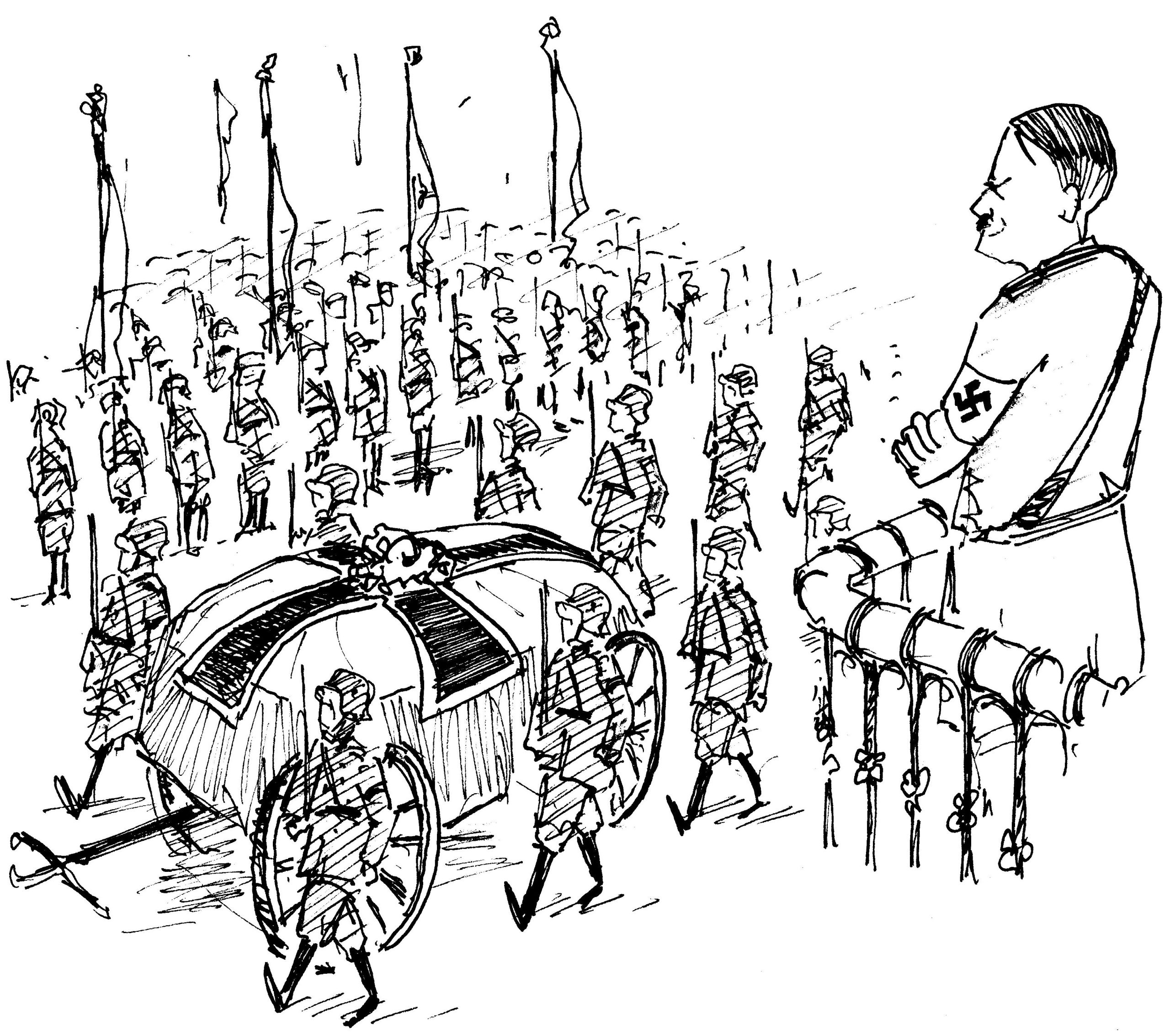
HITLER AND GERMAN REARMAMENT
The picture grew more grim by the hour,
As Hitler strengthened his grip on power.
The German President Hindenburg died,
In ’34. They were quick to decide
(The Nazis) that the roles of Chancellor
And President should be merged: der Führer
They called him. Step forward, Adolf Hitler.
Germany, Churchill warned, was “arming fast”.
Winston, in the wilderness, was aghast
At British complacency. Now, at last,
The people would sit up and take notice.
In November he warned the House of this:
Within the space of a year, Germany,
For sure, would have achieved air parity
With Britain. By 1937,
He predicted, the Nazis, great Heaven,
Would have built up an air force twice as large.
Stanley Baldwin flatly denied the charge.
Churchill was wide of the mark. In the air,
The British were strong – no need to despair.
Germany’s strength was half that of Britain,
And in a year’s time the country’s margin
Would still be greater by fifty per cent.
Baldwin’s reassurances were well meant,
But in ’35, the following May,
He had to retract, I’m sorry to say.
The defence estimates, for ’34,
Were lower than for the ten years before,
Despite these warnings. Should there be a war,
Britain was lamentably ill-prepared.
It’s as if the government hardly dared
To heed the danger. As Churchill despaired,
The powers-that-be, their heads in the sand,
Blundered on. It is hard to understand,
Looking back, how they could have done nothing.
Hindsight, of course, is a wonderful thing.
The Chiefs of Staff were going up the wall.
They did not agree with Baldwin at all,
Nor MacDonald. Something would have to give.
So they took a rare initiative.
Civil servants published a White Paper,
A definitive policy-shaper,
A bold Statement Relating to Defence.
Given the climate, it made perfect sense.
Issued on the 4 th of March, ’35,
It argued that, were Britain to survive,
She would need to be reliant on force.
The thunderbolt stuck in the throat, of course,
Of the Prime Minister. MacDonald knew,
And had always argued (one of the few)
That in the event disarmament failed –
Note: the talks had already been derailed –
War would be inevitable. So he,
Ramsay himself (who knew how willingly?),
Initialled the document: J. R. M.
The combined services chiefs (good for them)
Had given government a rude surprise.
It “could no longer,” they said, “close its eyes
“To the fact that adequate defences”
Were “still required”. So, mend your fences,
That’s what the military experts meant –
And, from that moment on, rearmament
Became settled government policy.
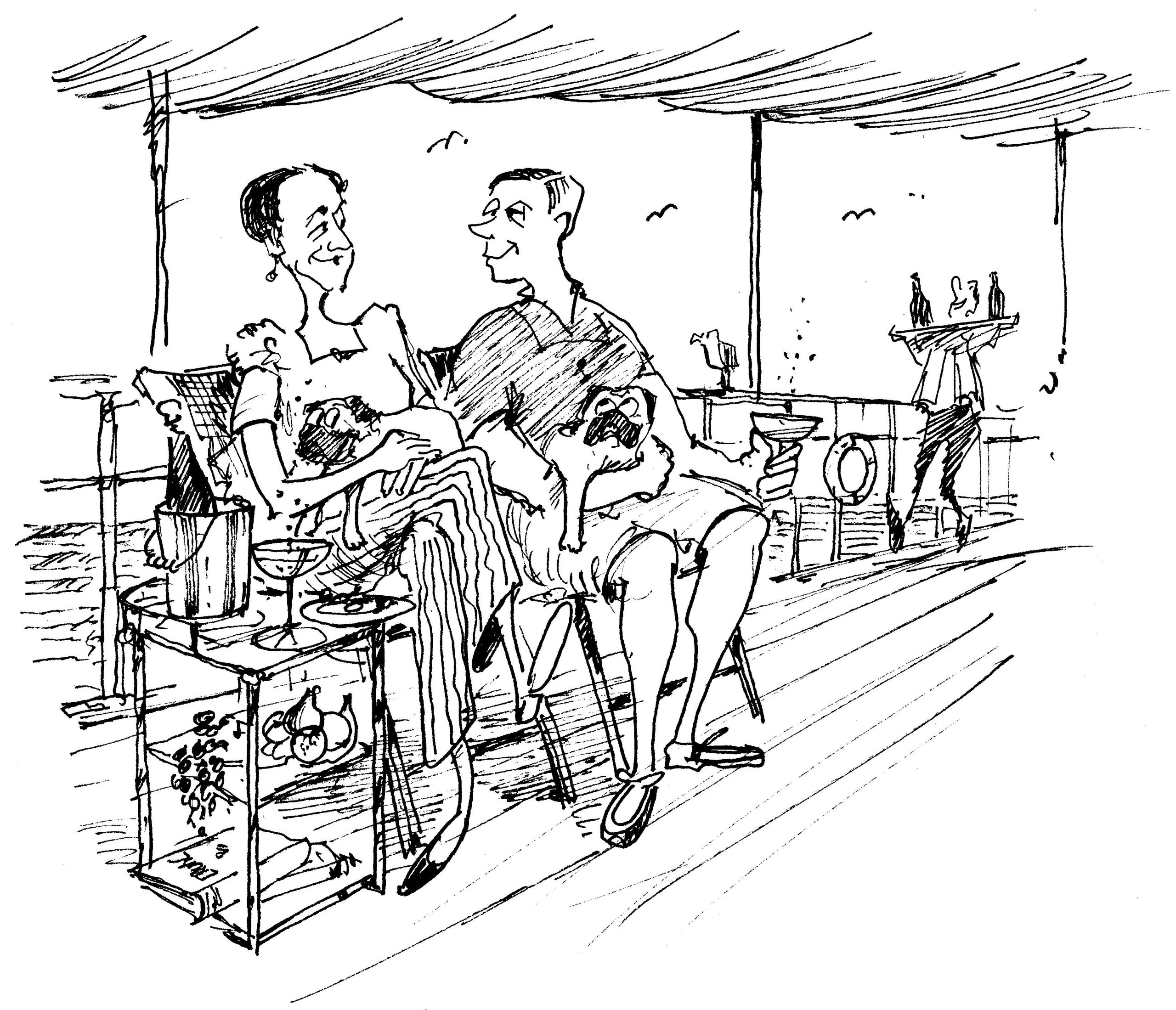
EDWARD THE EIGHTH
Mrs. Simpson, to my way of thinking,
Saved us from a pretty appalling King.
Wallis Simpson was an American,
Divorced, and married to another man,
Whom she would shortly sue for divorce too.
Now you might have imagined, mightn’t you,
That the King would steer clear of Mrs. S.
It soon became clear he couldn’t care less.
Edward was forty-one. He’d had affairs
Before this one (like many royal heirs),
But he was caught completely unawares
By the strength of political feeling
Against Wallis. It left the King reeling.
Stanley Baldwin was slow on the uptake.
The foreign newspapers, make no mistake,
Were full of it, but, believe it or not,
The British press were not saying a lot.
The people were in total ignorance
Of a crisis. Off to the south of France,
On a yacht, the King went on holiday,
With Mrs. Simpson. What more can I say?
Wallis apart, there can be little doubt
That the new King would not have been forced out.
Edward was most unsuitable, it’s true.
He was lazy and louche. Most people knew
(It was no secret) that he sympathised
With Hitler’s Nazis. So few were surprised
That he failed to recognise the danger –
Or perhaps didn’t care. Truth is stranger,
They say, than fiction. Who would have thought
That Edward the Eighth, an affable sort,
Might have brought down the British monarchy
Within twelve months? Baldwin (this we shall see)
Contrived to avert the catastrophe.
For Stanley was focused and kept his cool.
He declined to force Edward’s hand. No fool,
Baldwin acted with tact and vision:
The King must make his own decision.
And so he did. It was made clear to him
He had two choices. He was far from dim,
And he well understood the dilemma.
Edward, at heart a sensible fella,
Would have to give up the love of his life
Or renounce the throne. It cut like a knife,
But he chose Mrs. Simpson. There was talk,
Among friends, that, rather than take a walk,
A marriage could take place – ‘morganatic’,
So-called. The PM refused to panic:
That Mrs. Simpson should marry the King,
With no rights or privileges, nothing,
Was not on the cards, and he made that plain.
It didn’t take Baldwin long to explain
How awkward this arrangement would have been –
Wallis Simpson his wife, but not his Queen!
Edward then kicked up a bit of a scene,
By proposing a radio broadcast
To the nation. Baldwin was aghast.
His colleagues were urging him to act fast,
But their siren voices went unheeded.
He gave Edward all the time he needed,
But vetoed the broadcast: unusual
(At best) and unconstitutional.
Support for the King was ebbing away.
His cause was not much helped, I’m bound to say,
By Mosley’s Blackshirts (an unpleasant crowd)
Standing shoulder to shoulder, strong and proud,
With the Communists in Edward’s support.
He attracted strange bedfellows, in short –
Including Churchill, the little smarty,
Who tried to form a so-called ‘King’s Party’.
Then Simpson said she’d call off her divorce
And give up the King. He refused, of course.
Edward was set on abdication.
Wallis had become a fixation.
In full charge of the situation,
Baldwin presented to Parliament,
On December the 10 th , the Instrument
Of Abdication the King had signed,
And Edward and Wallis were soon consigned
To history. The Prime Minister’s speech,
It’s generally reckoned, was a peach.
The evening of the following day,
The former King finally had his say.
He addressed the British people, at last,
In a short farewell radio broadcast.
The “burden of responsibility”
Had proved impossible, for such as he,
Without, he declared, “the help and support
“Of the woman I love”. Edward had fought
(Or had he?) to keep his seat on the throne.
Nonetheless, in these “few words of my own”,
He explained why, as he put it, he “quit”.
Edward the Eighth was patently unfit
To be King. The long and the short of it
Was this: he lacked stamina, courage and grit.
Well, that’s one view. I give the man credit
For sticking to his guns. There, I’ve said it.
He never sought office. That much is clear.
Yet he caused offence, and it cost him dear.
The pair were married the following year.
Self-imposed exile is never, I fear,
A merry prospect. The couple, I hear
(I hope), found happiness. Give them a cheer.
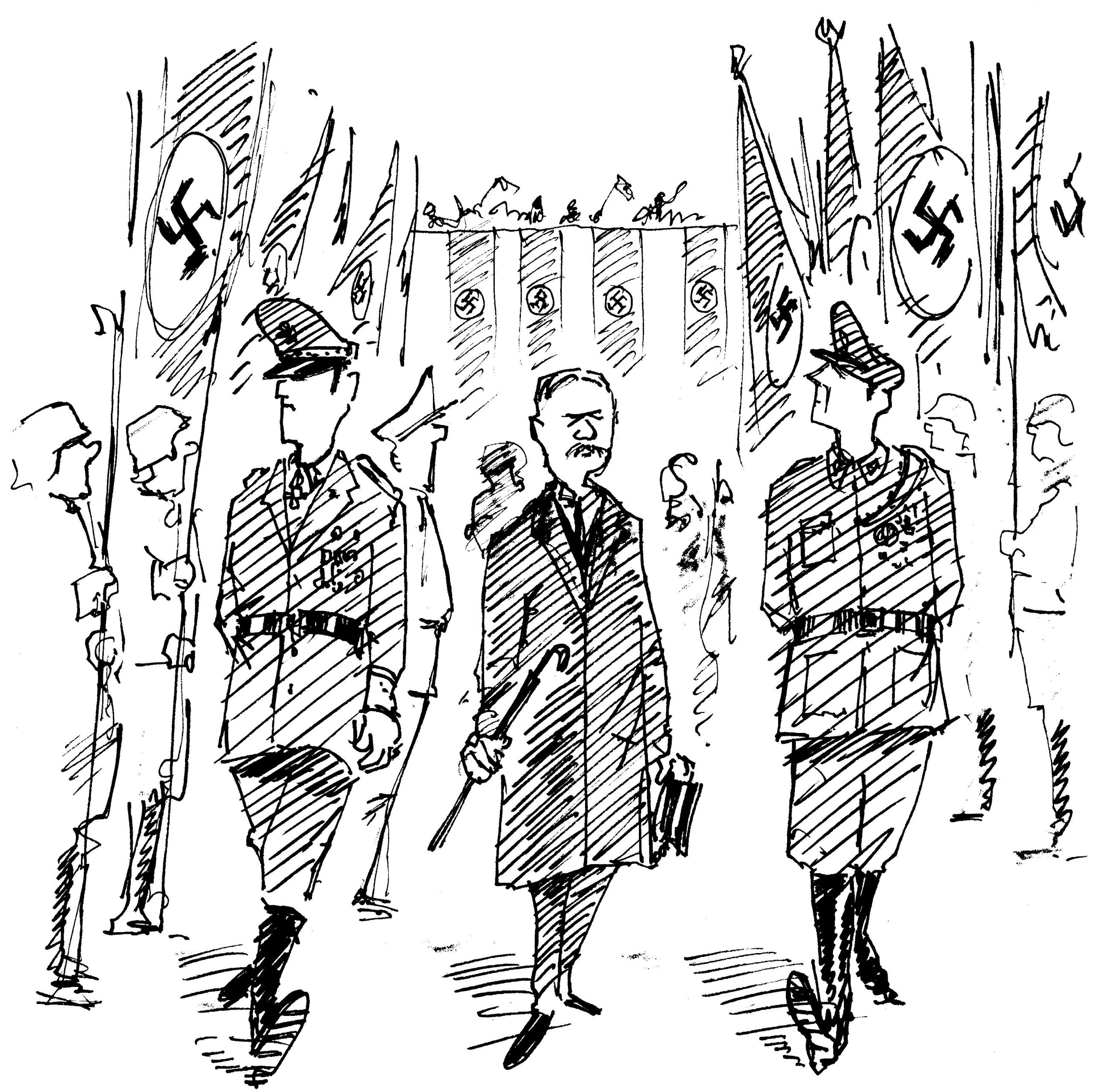
THE PRIME MINISTER VISITS HITLER
Without informing his closest allies,
The French, Chamberlain sprang a big surprise.
Acting alone, he sent a telegram
To Herr Hitler. He didn’t give a damn
For protocol. He would negotiate
With the Führer before it was too late –
Face to face. There was no time to explain
That he’d never been on an aeroplane.
There was little to lose, and much to gain.
This was the finest moment of his life!
Hitler invited him (he brought the wife)
To Berchtesgaten, his mountain retreat.
The amazement in Britain was complete.
This modest and unassuming fella,
With his winged collar and furled umbrella,
Caught the public imagination.
His visit, hailed as a sensation,
Would save Europe. Folk were electrified.
Good old Nev! He was all but deified.
For what? For refusing to draw the line
At flying, at the age of sixty-nine,
For the very first time in his life? Fine,
But there had to be more to it than that.
As for the Führer, I shall eat my hat
If he didn’t run rings round the old man.
“Heil!” they chorused, as his triumph began,
In the dense forest of Nazi salutes.
Chamberlain’s party, in their sombre suits,
Were dwarfed by the Nazi flags. The SS,
Hitler’s bodyguard, were dressed to impress.
So, Chamberlain met the Führer at last.
The Czechs were appalled, openly aghast:
All their hopes for peace were dwindling fast.
For Hitler was unprepared to bargain.
It soon became clear he cared not a pin
For the wretched Czechs, or for Chamberlain.
The PM hardly knew where to begin.
Adolf Hitler was hell-bent on conquest.
Poor Neville, he could only do his best.
At least he got the Führer to agree
To a diplomatic fait accompli
(So he thought). Unless events forced his hand,
Hitler gave Chamberlain to understand
That he would hold fire and not invade.
The worst of compromises had been made,
The honest Czechs browbeaten and betrayed.
But Chamberlain took Hitler at his word.
The Czechs had been spared. Patently absurd.
What exactly had been settled? Who knew?
The Führer (well, this was Chamberlain’s view)
Had agreed to respect the Czech frontiers
As they’d stood now for nearly twenty years.
Yet, within Czech borders, the hopes and fears
Of German-speakers had been satisfied.
This ‘understanding’ would be ‘ratified’
As soon as Hitler filled in the detail!
The outcome was perfect. It couldn’t fail.
The Prime Minister had fought tooth and nail
For peace. It was sadly to no avail.
For the Führer viewed the situation
Through his own eyes. Self-determination,
For the German Czechs, meant the Czech nation
Would be broken up, in effect destroyed.
Hitler, indeed, got extremely annoyed
When Chamberlain balked at the idea.
The two leaders were poles apart, I fear.
A pathway to peace? Alas, nowhere near.
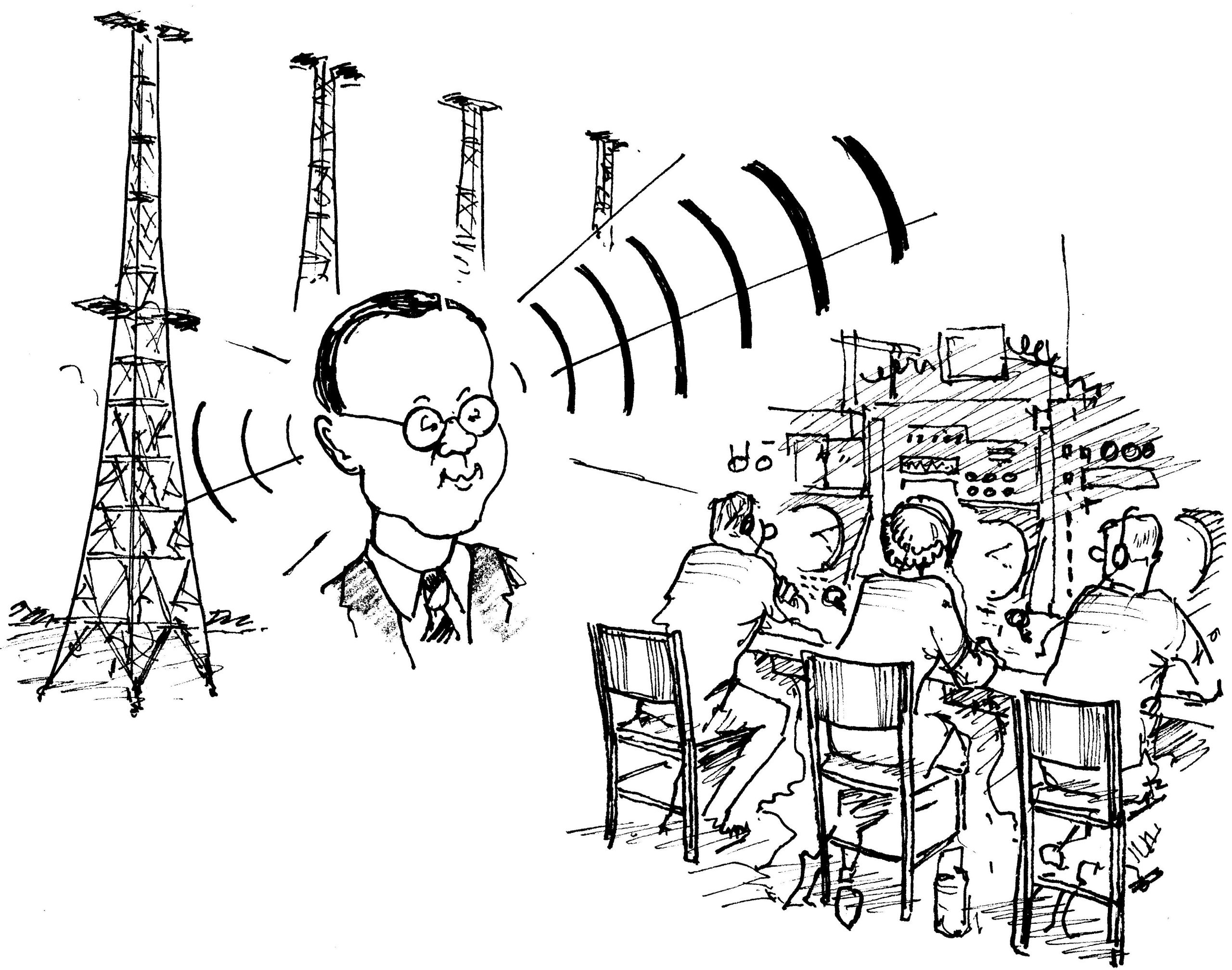
RADAR
There was no adequate form of defence
Against aerial bombing. No pretence,
Indeed, was ever made to this effect.
It was a scientist, as you’d expect,
Who saved the day. Prepare to genuflect
(Down on one knee) to Robert Watson-Watt,
Inventor of radar. A cheerful Scot,
He saved our bacon. We owe him a lot.
Watt started as a meteorologist,
Whose detailed study of the atmospherics
Emitted by thunderstorms enabled him
To issue warnings to airmen. On a whim,
He exploited his knowledge of radio
To locate new hazards. Those in the know
Were well impressed. This laddie would go far.
Those first steps were the genesis of radar,
By which radio instruments could detect
Distant objects in the air. Please don’t expect
A full scientific explanation,
But radar proved to be a sensation.
Developed over four years from ’35,
Watt’s invention was ready to ‘go live’
By 1939, a nasty surprise
For the Germans. For now the coveted prize
Of aerial defence was well within sight.
Radar stations stretched from the Isle of Wight
As far north as the Orkneys. Air warfare
Had been revolutionised. Hardly fair,
Perhaps, on the Germans, who had no radar –
But we had the wherewithal, so there you are.
Enemy bombers could no longer surprise
Our forces. Fighters now had time to rise
To the challenge. The fortunes of ‘the few’
Depended on radar, and this they knew.
Many planes got through, of course, those who dared,
But hundreds of thousands of lives were spared.
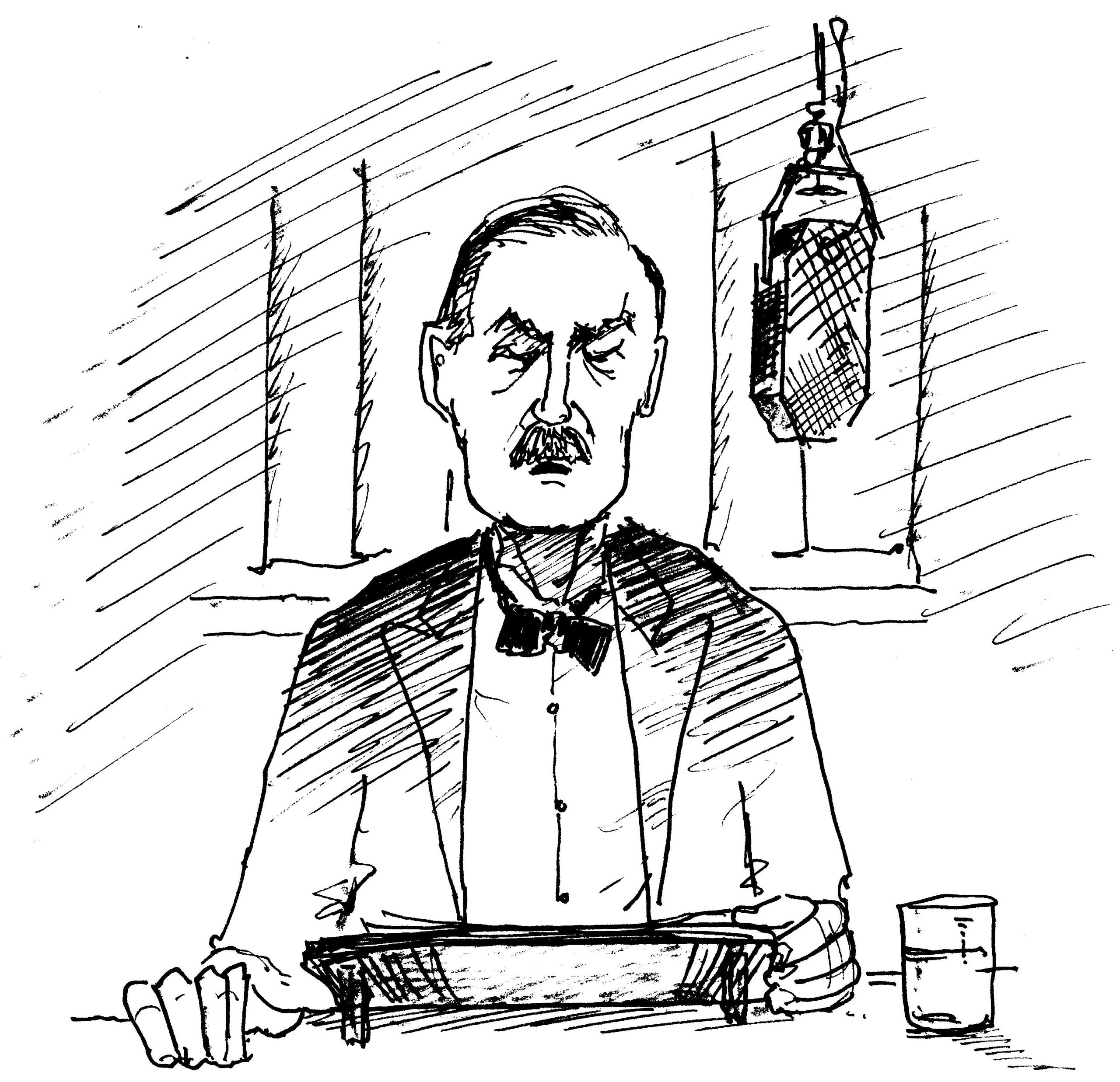
WAR WITH GERMANY
The British ultimatum expired
At 11 a.m. Bitter, tired,
A near-broken man, Chamberlain broadcast
To the people. We were at war at last.
His tone was pitiful, grim and downcast
“But I am confident that right will prevail”.
He faced a challenge on a massive scale.
Regrets and heartache were to no avail.

